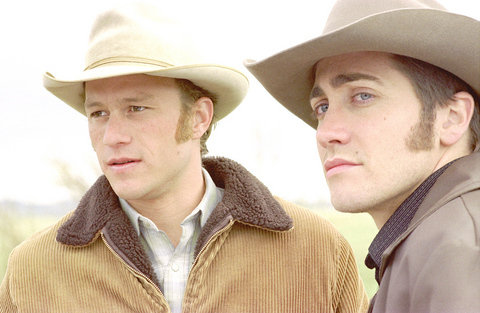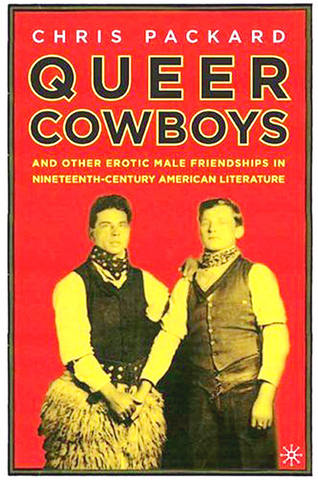Brokeback Mountain isn't the first popular fiction featuring cowboys with more than roping and wrangling on their minds.
Our eros has always been cowboys, according to Chris Packard, author of Queer Cowboys, an analysis of 19th century frontier writings about erotic male relationships that may have been sexual in nature.
"I use those words `erotic' and `sexual' very carefully," Packard said. "Sexuality is different from eroticism. My book tries to point out these are homoerotic friendships, whether they're sexual is not part of the literature. Unless you have evidence, you really have to err on the side of eroticism."

PHOTO: AP
Queer Cowboys uses excerpts from authors such as Mark Twain, Owen Wister and James Fenimore Cooper to make Packard's case that homoerotic bonds in the Old West were common and socially accepted. Vintage photographs depict men romantically touching or dancing together while women stand aside. Frederic Remington's sketches of cowboys sharing a haircut and exiting a tent are suggestively posed.
Reading between the lines is necessary in some cases, such as this portion of Badger Clark's 1917 poem, The Lost Pardner, which could pass as a plot outline of Brokeback Mountain:
"We loved each other in the way men do

PHOTO COURTESY OF AMAZON
And never spoke about it, Al and me,
But we both knowed, and knowin' it so true
Was more than any woman's kiss could be.
We knowed -- and if the way was smooth or rough,
The weather shine or pour,
While I had him the rest seemed good enough
But he ain't here no more!"
Queer Cowboys joins Ang Lee's film as elements of a budding revision of Western archetypes, especially the ruggedly heterosexual American cowboy, the myth of self-reliant men with checkered pasts seeking fresh starts on the lawless range. Dime novels of the era romanticized gunfights and campfire confessions but seldom addressed frontier sexuality except in code phrases such as a cowboy's "sex hunger," crude nicknames for genitalia and "mastering passion" lessons passed down to greenhorns. Wister's The Virginian had two cowboys practicing a wedding ceremony. In these books, settling down with a traditional family is considered the end of the adventure.
Until Brokeback Mountain, Western movies also mostly coded homoerotic themes. Looking back we wonder about the closeness of Butch Cassidy and the Sundance Kid, and detect flirting among gunslingers in The Wild Bunch. Billy the Kid's murder in The Left Handed Gun plays like a crime of gay passion. Val Kilmer's Doc Holliday in Tombstone promising to be "your huckleberry" to an adversary was fey on first impression. Reading Packard's take on the homoerotic subtext of Twain's The Adventures of Huckleberry Finn turns Doc's "huckleberry" threat into a come-on.
The most notable example of Hollywood's subversion of straight cowboy images is Howard Hawks' 1948 classic Red River, featuring John Ireland as a tough guy with the effeminate name Cherry Valance.
Cherry makes a veiled pass at a cowboy played by Montgomery Clift, whose real-life homosexuality was barely concealed by the studio system, by admiring his gun and comparing women to Swiss watches. "You ever had a (suggestive pause) Swiss watch?" Cherry asks with a lascivious smile.
Clift's film debut also includes a mocking dance with the ultimate cowboy icon, John Wayne, that is slightly flirtatious in hindsight. Any suggestion the Duke would have anything to do with expressing homosexual themes makes some people gasp.
That's exactly the reaction Packard seeks.
"Everybody should appreciate shock," he said. "Basically, what happens after the shock, after the recoiling, I hope, is some reflection, some wonder, `Why am I shocked?' Inquiring minds don't linger on shock then leap to rejection. And those people who do leap to rejection after the shock? That's just their limitation."
Packard's analysis of frontier literature could be slanted by modern perspective. The word "homosexual" wasn't coined until the late 19th century and "queer" simply meant something odd. Perhaps the vaguely erotic prose and images cited in Queer Cowboys are products of a naive society that hadn't yet passed judgment on gay intimacy. Packard acknowledged that possibility.
"But what else can we do except use our culture and knowledge to look backward in time?" he said. "We can't escape the knowledge that has accumulated in the last 25 years regarding gay and lesbian rights and the emergence of gay culture. You can't do away with that. You can't `not know' that. You look back in time, take current knowledge and apply it. Culture continues to accumulate meaning.
"You wonder if people back then would even know what to call this, if there was even a word for it. But there was a different set of rules about sexuality, that's for sure."
Rules changed over the decades from anything goes to nothing revealed. Attempts by Sigmund Freud and Alfred Kinsey to illuminate homosexual urges repulsed some people, while homophobic undertones of the McCarthy hearings lumped gays with criminals and communists in terms of undermining the American way.
The subsequent rise of gay rights and a bolder sense of artistic freedom refreshed the issue. Packard senses a change in grudging acceptance of his ideas, recalling an exchange with a former rodeo bull rider at a panel discussion of the gay West topic.
"He hadn't seen any actual sexuality on the rodeo circuit," Packard said. "But he didn't deny that friendships in that very macho community were stronger than other bonds. He questioned the validity of my research but he couldn't deny that eroticism."
Which begs the question: What would someone like Twain think about Packard's take on his writings?
"I would love to talk to Twain and find out what he would say," Packard said. "I think he would have a real fun twinkle in his eye, then deny it forever."

On April 26, The Lancet published a letter from two doctors at Taichung-based China Medical University Hospital (CMUH) warning that “Taiwan’s Health Care System is on the Brink of Collapse.” The authors said that “Years of policy inaction and mismanagement of resources have led to the National Health Insurance system operating under unsustainable conditions.” The pushback was immediate. Errors in the paper were quickly identified and publicized, to discredit the authors (the hospital apologized). CNA reported that CMUH said the letter described Taiwan in 2021 as having 62 nurses per 10,000 people, when the correct number was 78 nurses per 10,000

As we live longer, our risk of cognitive impairment is increasing. How can we delay the onset of symptoms? Do we have to give up every indulgence or can small changes make a difference? We asked neurologists for tips on how to keep our brains healthy for life. TAKE CARE OF YOUR HEALTH “All of the sensible things that apply to bodily health apply to brain health,” says Suzanne O’Sullivan, a consultant in neurology at the National Hospital for Neurology and Neurosurgery in London, and the author of The Age of Diagnosis. “When you’re 20, you can get away with absolute

May 5 to May 11 What started out as friction between Taiwanese students at Taichung First High School and a Japanese head cook escalated dramatically over the first two weeks of May 1927. It began on April 30 when the cook’s wife knew that lotus starch used in that night’s dinner had rat feces in it, but failed to inform staff until the meal was already prepared. The students believed that her silence was intentional, and filed a complaint. The school’s Japanese administrators sided with the cook’s family, dismissing the students as troublemakers and clamping down on their freedoms — with

As Donald Trump’s executive order in March led to the shuttering of Voice of America (VOA) — the global broadcaster whose roots date back to the fight against Nazi propaganda — he quickly attracted support from figures not used to aligning themselves with any US administration. Trump had ordered the US Agency for Global Media, the federal agency that funds VOA and other groups promoting independent journalism overseas, to be “eliminated to the maximum extent consistent with applicable law.” The decision suddenly halted programming in 49 languages to more than 425 million people. In Moscow, Margarita Simonyan, the hardline editor-in-chief of the